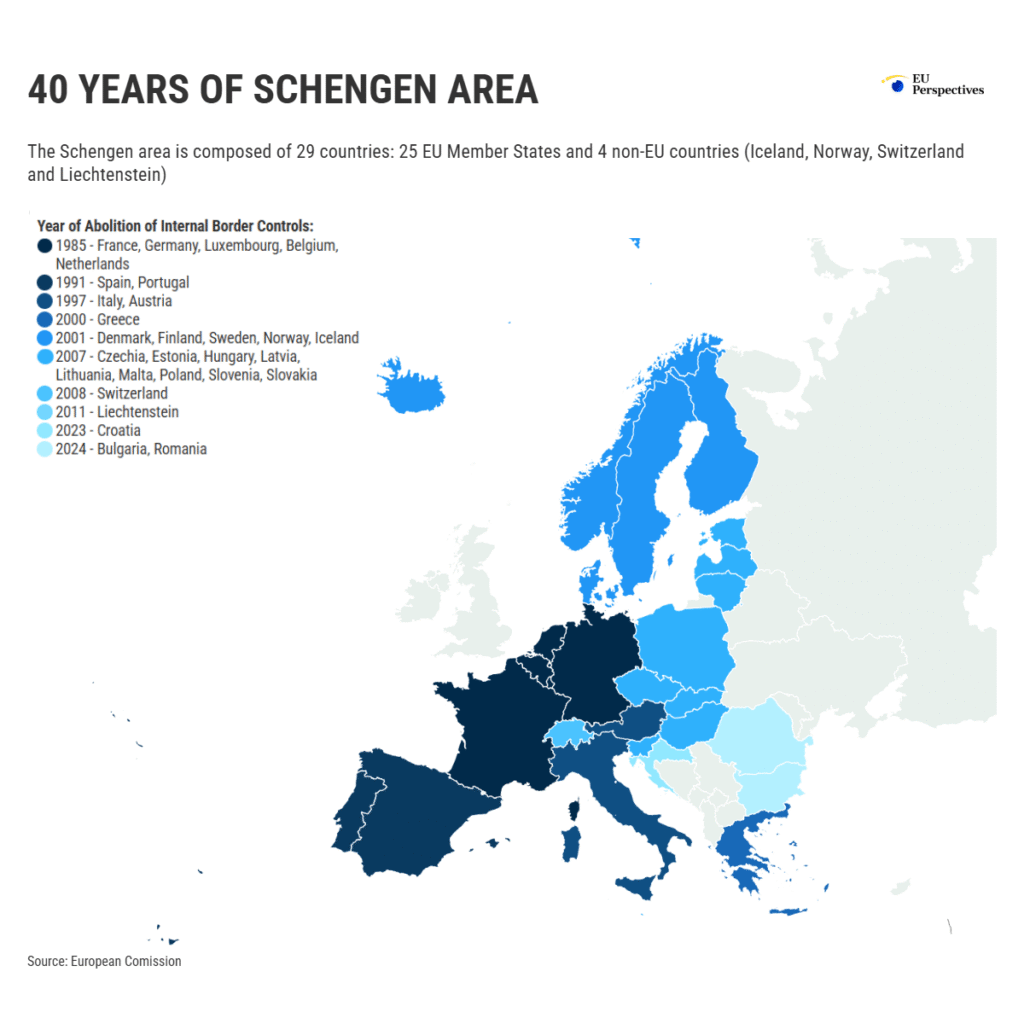What remains of the Schengen Agreement today seems to be a distant memory of what the EU celebrates as a milestone and success of European integration. The free movement of goods and people within its borders is increasingly under pressure as security within member states is tightening due to various threats.
On 11 June 1985, five countries—West Germany, France, Belgium, the Netherlands and Luxembourg—signed the Schengen Agreement in a tiny town of the same name, laying the foundations for free movement without internal border controls. However, the area has grown to include 29 countries and over 450 million people. Today, Schengen remains one of the most tangible achievements of European integration

It also is very fragile. In recent years, freedom of movement has been threatened by migration crises, terrorist attacks, pandemics and new geopolitical tensions. Temporary internal controls have reappeared with unsettling regularity.
Who won Gibraltar, really?
On the 40th anniversary of the agreement, the European Union, Spain, and the United Kingdom signed a symbolically charged agreement. Gibraltar will effectively enter the Schengen area, despite Britain now being not only outside of the Schengen area but also of the entire Union. The new agreement allows citizens and visitors of Gibraltar to enter Spain—and thus the rest of the Schengen area—without border controls. The external border is to move to Gibraltar’s airport and port, where Frontex agents will perform the border checks on behalf of Schengen.
“Free movement is vital for Europe’s competitiveness, and border controls harm citizens,” said Magnus Brunner, EU Commissioner for Home Affairs and Migration. He stressed that “we need to build trust between member states. Only in this way can Schengen work”. The agreement on Gibraltar “safeguards the integrity of Schengen and the single market while ensuring stability, legal certainty and prosperity for the region,” remarked Ursula von der Leyen, President of the EU Commission.
Monitoring the populists
In the wake of the celebrations of the European success for free movement, Henna Virkkunen, the Commissioner for Technology Sovereignty, recalled that Schengen itself “is under pressure from populists who want to dismantle it. If we do not react with determination, we risk losing it, as security in Europe is at an all-time low since the Second World War.”
Defend the unrestricted free movement of people by ensuring that the reintroduction of internal border controls remains a measure of last resort. EU Council
Over the decades, the Schengen area arrangement has earned much praise from Europeans and worldwide academic circles alike. Its day-to-day operation, however, has lately been under increasing pressure. All EU member states, except Cyprus and Ireland, plus Iceland, Liechtenstein, Norway, and Switzerland should, in theory, have no internal border controls. In practice, however, this does not seem to be the case anymore.
In 2024, 28 per cent of Europeans experienced internal border controls while travelling to other Schengen countries. More than half of Austrian citizens had to undergo border checks, ahead of 48 percent of Danes, Croatians, and Slovenians.
You might be interested
The Union’s institutions view the trend with growing unease. The European Court of Justice has repeatedly called out member states for abusing the reintroduction of the controls. “Defend the unrestricted free movement of people by ensuring that the reintroduction of internal border controls remains a measure of last resort,” read a note from the EU Council on 11 June. “Adopt all appropriate measures in the field of external border management, secondary movements, migration, repatriation of those residing illegally, as well as prevention. Fight against offline and online cross-border crime, terrorism, as well as emerging threats such as hybrid or cybercrime,” the note urged.











